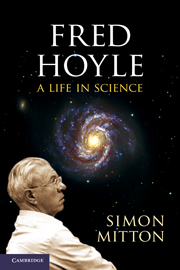Book contents
- Frontmatter
- Contents
- FOREWORD
- PROLOGUE
- 1 AN END AND A BEGINNING
- 2 TRAINING FOR COSMOLOGY
- 3 THE STAR MAKERS
- 4 HOYLE'S SECRET WAR
- 5 THE NATURE OF THE UNIVERSE
- 6 LIVES OF THE STARS
- 7 CLASH OF TITANS
- 8 ORIGIN OF THE CHEMICAL ELEMENTS
- 9 MATTERS OF GRAVITY
- 10 MOUNTAINS TO CLIMB
- 11 THE WATERSHED
- 12 STONES, BONES, BUGS AND ACCIDENTS
- ACKNOWLEDGEMENTS
- NOTES
- BIBLIOGRAPHY
- INDEX
- Plate Section
4 - HOYLE'S SECRET WAR
Published online by Cambridge University Press: 03 May 2011
- Frontmatter
- Contents
- FOREWORD
- PROLOGUE
- 1 AN END AND A BEGINNING
- 2 TRAINING FOR COSMOLOGY
- 3 THE STAR MAKERS
- 4 HOYLE'S SECRET WAR
- 5 THE NATURE OF THE UNIVERSE
- 6 LIVES OF THE STARS
- 7 CLASH OF TITANS
- 8 ORIGIN OF THE CHEMICAL ELEMENTS
- 9 MATTERS OF GRAVITY
- 10 MOUNTAINS TO CLIMB
- 11 THE WATERSHED
- 12 STONES, BONES, BUGS AND ACCIDENTS
- ACKNOWLEDGEMENTS
- NOTES
- BIBLIOGRAPHY
- INDEX
- Plate Section
Summary
Early in the war, Lyttleton and Hoyle had approached the Meteorological Office to see whether it had any use for the services of Cambridge mathematicians, but nothing resulted from this enquiry. They were concerned that compulsory military service might be introduced, though they figured they might be able to avoid it by supporting the war effort as civilian research scientists. Fred's call away from Cambridge eventually came from the Admiralty in Whitehall. A recruitment officer, Fred Brundrett, followed up a recommendation from Maurice Pryce, who had been hired by the Admiralty only a couple of months earlier. He set up an interview with Hoyle: the only offer on the table for him was a research position working on the development of radar. Brundett offered a salary worth about one-third of the emoluments from Hoyle's fellowships, which would be suspended. Fred accepted and agreed to be posted to the Signal School in Portsmouth.
The importance of radar technologies in combat had come to be appreciated soon after Hitler became a threat in 1933. The British government began to assess the possibility that Germany might launch an air assault on England and, in 1934, a large-scale air defence exercise was held to test the defences of southern England. Mock raids were carried out on London. Even though their routes and targets were known in advance, well over half the bombers reached their targets without opposition. Prime minister Stanley Baldwin's statement, ‘The bomber will always get through’, seemed true.
- Type
- Chapter
- Information
- Fred HoyleA Life in Science, pp. 81 - 107Publisher: Cambridge University PressPrint publication year: 2011



